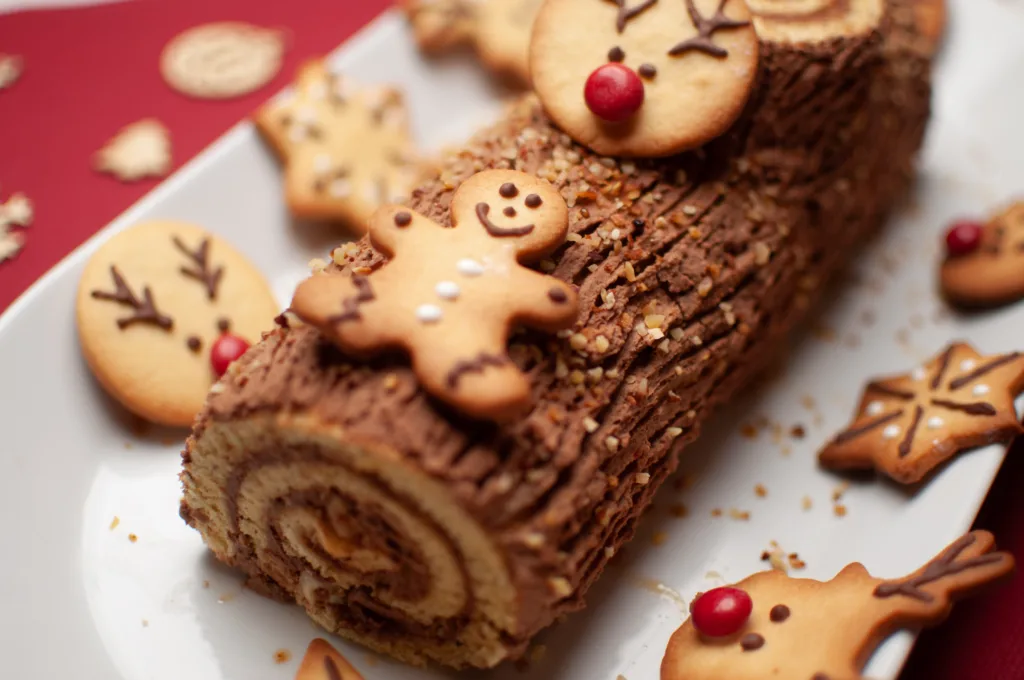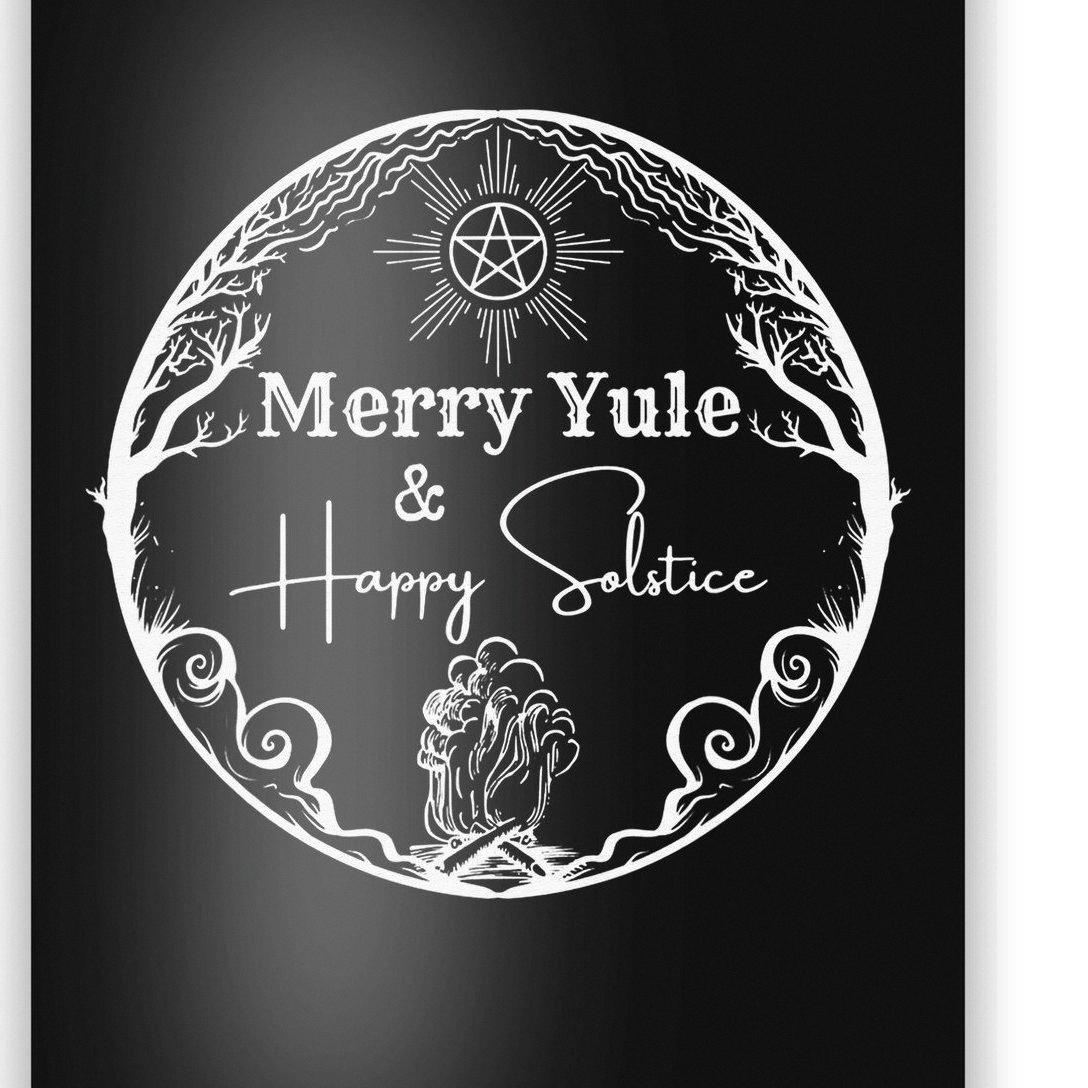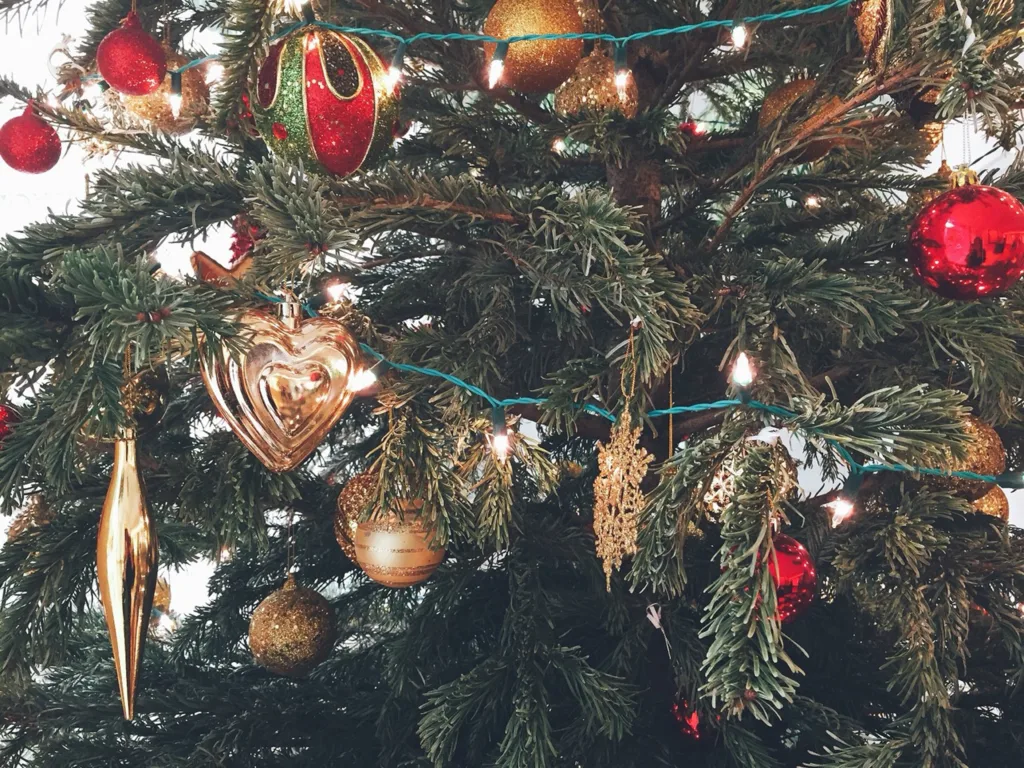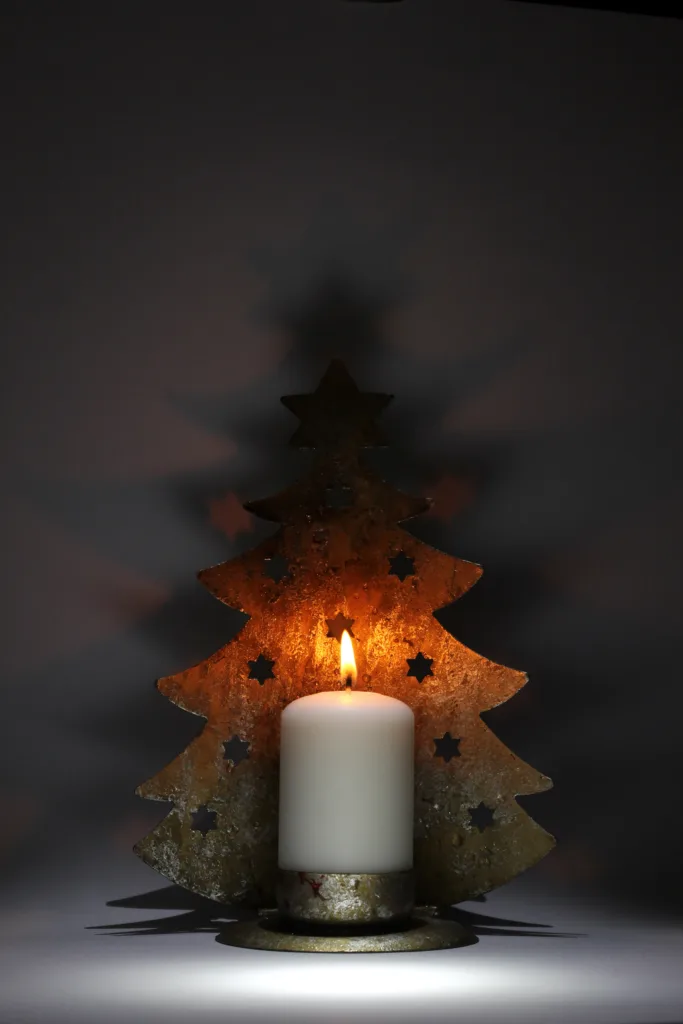Happy Yule! The term “yule” is often associated with Christmas, but it actualy has roots in pagan traditions. Yule is the celebration of the winter solstice, which occurs around December 21st in the Northern Hemisphere. This is the longest night of the year, and from this point forward, the days begin to grow longer and brighter.
In pagan traditions, Yule is the time when the Oak King, who represents the light of the new year, conquers the Holly King. This battle between light and dark symbolizes the triumph of good over evil and the return of hope and positivity.
During Yule, people would traditionally bring large logs home and set them on fire as a symbol of the returning light. These Yule logs were meant to burn throughout the night, providing warmth and light for the celebrants.
Today, many people still celebrate Yule in various ways. Some may light candles or decorate their homes with evergreens and holly, which are symbols of the winter solstice. Others may hold feasts or exchange gifts with loved ones.
If you’re looking for ways to celebrate Yule, here are some ideas to get you started:
– Light candles or a Yule log to symbolize the returning light.
– Decorate your home with evergreens, holly, and other symbols of winter.
– Hold a feast with friends and family, incorporating traditional Yule foods like roast meats and spiced cider.
– Exchange gifts with loved ones, giving thanks for the light and warmth they bring to your life.
– Take a moment to reflect on the past year and set intentions for the year ahead.
No matter how you choose to celebrate, may your Yule be filled with warmth, light, and joy. Happy Yule!
Celebrating Yule: Is Happy Yule an Appropriate Greeting?
Yule is a holiday that is celebrated by many people around the world, particularly thse who follow pagan or Wiccan traditions. It marks the winter solstice, which is the longest night of the year, and the beginning of a new solar cycle. During this time, the Oak King is said to conquer the Holly King, representing the light of the new year.
When it comes to greetings for Yule, there are a few common phrases that people use. “Happy Solstice” is one of them, as it acknowledges the astronomical significance of the day. “Merry Yuletide” is another common greeting, which specifically references the holiday itself. And of course, “Happy Yule” is a straightforward way to wish someone well during this time.
It’s worth noting that not everyone celebrates Yule or observes the winter solstice, so it’s important to be mindful of that when choosing your greetings. If you’re unsure whether someone celebrates Yule, it’s best to stick with more general holiday greetings like “Happy Holidays” or “Season’s Greetings.”
“Happy Yule” is a perfectly acceptable greeting for those who celebrate the holiday, but it’s important to be aware of your audience and choose your words accordingly.

The Meaning of Happy Yule
When smeone says “Happy Yule,” they are essentially wishing you a joyful and festive Christmas season. Yule is an Old English word that originally referred to a pagan festival celebrating the winter solstice. However, with the spread of Christianity, the term came to be associated with Christmas. Today, Yule is often used as a synonym for Christmas, and “Happy Yule” is a greeting that is similar to “Merry Christmas.” It is a way to express goodwill and cheer during the holiday season. People who celebrate Yule may also use this greeting to express their joy and excitement for the season. So, when someone says “Happy Yule,” they are simply wishing you a happy and enjoyable Christmas season.
Saying Happy Yule in Old Norse
In Old Norse, the language spoken by the Vikings, the traditional greeting for the Yuletide season would likely have been “Glaðligr Jól.” This phrase translates to “Happy Yule” in English.
It is important to note that the Old Norse language is no longer in use, and the pronunciation of this phrase may vary depending on the region and time period in whih it was spoken. Additionally, Old Norse was a highly inflected language, meaning that the endings of words could change depending on the grammatical context.
Despite these complexities, “Glaðligr Jól” is generally accepted as the closest approximation to the festive greeting that would have been used during the Yuletide season in Old Norse-speaking communities.
Other related phrases that may have been used during this time period include “Farsælt Komandi Ár” (meaning “Prosperous Coming Year”) and “Gleðileg Jól og farsælt nýtt ár” (meaning “Happy Yule and a Prosperous New Year”).
The Yuletide season held great significance in the Norse world, with feasting, gift-giving, and other festive traditions marking the occasion. While the specific language used to express holiday greetings may have varied, the spirit of celebration and goodwill would have been shared by all.
The Meaning of Yule in Christmas
Yule is an ancient pagan celebration that has been incorporated into modern Christmas traditions. It is celebrated on the winter solstice, which is typically around December 21st, and marks the longest night of the year. The word Yule originated from the Old Norse word “jól” which means “feast” or “revelry”.
During Yule, people would come together to feast, drink, and celebrate the return of the sun. They would decorate their homes with evergreen branches and holly, symbols of life and rebirth. One of the most well-known Yule traditions is the lighting of the Yule log. In ancient times, families would bring in a large log, light it on fire, and keep it burning for twelve days.
As Christianity spread throughout Europe, Yule was gradually absorbed into Christmas celebrations. Many of the traditional Yule customs were adapted into Christian traditions, such as the use of evergreens and the Yule log. The word “Yule” is still used in modern times to refer to the Christmas season, particlarly in Scandinavian countries.
Yule is an ancient pagan celebration that has been incorporated into modern Christmas traditions. It is celebrated on the winter solstice and marks the longest night of the year. Yule traditions include feasting, drinking, and the lighting of the Yule log. These traditions have been adapted into Christian celebrations, but the word “Yule” is still used in modern times to refer to the Christmas season.
Saying ‘Happy Yule’ in Irish
Yule is a traditional winter festival celebrated in many cultures, and in Irish, it is referred to as “Geimhreadh” or “An Gheimhridh.” When it comes to expressing holiday greetings, Irish has its own unique phrases.
To say “Happy Yule” in Irish, one can use the phrase “Nollaig Shona Dhuit,” which translates to “Happy Christmas to you.” This phrase is commonly used during the holiday season and is pronounced as “Null-eg hunna with.” It is important to note that “Nollaig Shona Dhuit” is specific to Christmas and not necessarily Yule, as the two holidays have different origins and meanings.
In addition to “Nollaig Shona Dhuit,” there are other Irish phrases that can be used to express holiday greetings. Some of tese include “Beannachtaí na Féile,” which means “Blessings of the Season,” and “Athbhliain faoi mhaise duit,” which translates to “A Prosperous New Year to You.”
Irish has a rich history and culture, and its language reflects this. Whether you are celebrating Yule, Christmas, or any other winter holiday, using Irish phrases to express holiday greetings can be a unique and meaningful way to connect with Irish heritage and culture.

Source: teeshirtpalace.com
Saying Happy Yule in Swedish
Yule is an important holiday celebrated in many parts of Europe, including Sweden. If you’re looking for a way to greet your Swedish friends or acquaintances during this festive season, you may be wondering how to say “Happy Yule” in Swedish. The traditional Swedish greeting for Yule is “God Jul”, which directly translates to “Merry Christmas”.
However, Yule is not just a celebration of Christmas in Sweden. It is a time to honor the winter solstice and the return of the sun after the darkest time of the year. In this context, some Swedes prefer to use the term “Glad Yule” or “Glad Jul” which translates to “Happy Yule” or “Happy Christmas”.
Other greetings that can be used during Yule in Sweden include “God Fortsättning” which means “Happy continuation” and is commonly used to wish smeone a good continuation of the holiday season. Another greeting is “Trevlig Helg” which means “Happy Holidays” and is used to wish someone a pleasant holiday season in general.
The most common way to say “Happy Yule” in Swedish is “Glad Jul” or “Glad Yule”. However, other greetings such as “God Fortsättning” and “Trevlig Helg” can also be used to convey well wishes during the holiday season in Sweden.
The Religion of Yule
Yule is not a religion, but rther a pagan celebration that marks the winter solstice. It is celebrated by many different pagan traditions, such as Wicca, Druidism, and Asatru. These traditions have their own unique beliefs and practices, but they all share the common celebration of the winter solstice and the rebirth of the sun.
The origins of Yule can be traced back to ancient pagan societies who saw the winter solstice as a time of death and rebirth. They believed that the sun was dying and needed to be nurtured and protected in order to be reborn. To celebrate this rebirth, they would light fires and candles, decorate trees and homes with evergreen boughs and holly, and exchange gifts.
Today, many pagans still celebrate Yule in much the same way, with rituals and traditions that honor the rebirth of the sun and the turning of the seasons. Some common Yule practices include:
– Lighting candles and fires to symbolize the returning light
– Decorating with evergreens, holly, mistletoe, and other symbols of the season
– Holding feasts and sharing food with loved ones
– Performing rituals to honor the gods and goddesses of the season
– Exchanging gifts as a symbol of love and generosity
Yule is not associated with any one specific religion, but is instead a celebration of nature, the changing seasons, and the rebirth of the sun.
The Purpose of Celebrating Yule
Yule is a winter celebration that has been observed for centuries by vrious cultures around the world. The purpose of celebrating Yule is to mark the winter solstice, which occurs around December 21st each year. The solstice is the shortest day and longest night of the year, and it signals the turning point when the days start to get longer and the nights shorter.
The celebration of Yule is closely linked to the cycles of nature and the changing seasons. In many cultures, Yule is a time to honor the rebirth of the Sun and the return of light to the world. It’s a time to reflect on the past year, let go of old habits and beliefs, and make way for new beginnings.
For many, Yule is a time of gathering with family and friends, feasting, and exchanging gifts. It’s a time to come together and share in the warmth and joy of the season. In some traditions, Yule is also a time for spiritual renewal and connecting with the divine.
The purpose of celebrating Yule is to honor the natural cycles of the earth and to celebrate the return of light and life to the world after the dark and cold of winter. It’s a time to reflect on the past, embrace change, and look forward to the future with hope and optimism.
Celebrating Yule
Yule is a festival celebrated by many cultures around the world during the winter solstice, typically on December 21st or 22nd. During this time, various customs and traditions are observed to mark the occasion.
One of the most common practices during Yule is the lighting of bonfires. These fires symbolize the return of light and warmth after the darkness and cold of winter. They also serve as a gathering place for communities to come together and celebrate.
Another common Yule tradition is the decoration of homes and public spaces with holly, mistletoe, and evergreen boughs. These plants were believed to have protective properties and were used to ward off evil spirits. They also represented the continuity of life during the winter months.
Ritual sacrifices were also a part of Yule celebrations in some cultures. Animals such as goats or pigs were often offered as a sacrifice to the gods in exchange for prosperity and good fortune in the coming year.
Feasting was another important aspect of Yule. Communities would come together to share food and drink, often including special Yule-themed dishes such as roasted meats, spiced wine, and fruit cakes.
Gift-giving was also a part of Yule celebrations. This tradition was meant to show appreciation for loved ones and to spread joy and generosity during the holiday season.
Yule is a time of celebration and ritual, marked by bonfires, decorations, sacrifices, feasting, and gift-giving. These traditions have been observed by many cultures throughout history and continue to be observed today.

The Origins of Yule: Celtic or Norse?
Yule is generally considered a Norse festival that originated in Scandinavia. The word “Yule” itself cmes from the Old Norse word “jol,” which means “wheel” or “cycle.” The celebration of Yule was an important event in the Norse calendar, and it marked the winter solstice, which typically falls on December 21st or 22nd.
However, it is worth noting that Yule celebrations have also been associated with Celtic traditions in some contexts. This is due in part to the fact that the winter solstice was an important event in many ancient cultures, and themes of light, fire, and feasting were common across many different traditions.
That being said, Yule is most commonly associated with Norse mythology and traditions. During the festival, people would light fires and candles to symbolize the return of the sun and the lengthening of days. Feasting was also an important part of the celebration, with many traditional foods and drinks served.
While Yule has some connections to Celtic traditions, it is primarily considered a Norse festival that celebrates the winter solstice and the return of the sun.
What Is the Meaning of Yule?
Yule is not a God, but rather a festival that was historically observed by the Germanic peoples. However, scholars have connected the original celebrations of Yule to the god Odin, who was a prominent figure in Norse mythology. Odin was associated with wisdom, knowledge, war, and death, and was often depicted as a wanderer with a long beard and a hat. He was also said to lead the Wild Hunt, a group of spectral hunters who rode across the sky during the winter solstice.
It is important to note that Yule was originally a pagan celebration that predated Christianity, and was later adapted into the Christian holiday of Christmas. In some modern pagan religions, Yule is still celebrated as a festival of the winter solstice and a time to honor the cycles of nature and the changing of the seasons.
While Yule is not associated with a specific God, it does have ties to Odin and oher pagan beliefs.
Is Yule a Pagan Celebration?
Yule is indeed a pagan word, originally used to refer to the winter solstice celebration in Germanic and Nordic cultures. The term comes from the Old Norse jōl, which was a 12-day feast in honor of the god Odin and the beginning of the new year. The celebration included feasting, drinking, gift-giving, and the lighting of fires to ward off evil spirits durng the long, dark winter nights.
Over time, as Christianity spread throughout Europe, the celebration of Yule was incorporated into the Christmas holiday, with many of its pagan traditions and symbols (such as the Yule log and the Christmas tree) being adapted and given new meanings. The word Yule itself was eventually replaced by the word Christmas, but its pagan origins are still reflected in many of the customs and traditions associated with the holiday today.
Yule is a pagan word with roots in ancient Nordic and Germanic cultures, and it has been incorporated into the Christmas holiday over time.
Do Christians Celebrate Yule?
Yule is a festival that has been celebrated for centuries by Pagans, Wiccans, and other earth-based religions. It is traditionally celebrated on the winter solstice, which is the shortest day and longest night of the year. However, in recent years, there has been a growing interest in Yule among Christians, who wonder if they can celebrate this festival.
The short answer to this question is yes, Christians can celebrate Yule. While Yule has strong roots in Paganism, it is not an anti-Christian festival. In fact, many of the customs and traditions associated with Yule have been incorporated into Christmas celebrations. For example, the Yule log, which is burned during the festival, is thought to have inspired the Christmas log, which is still burned in some countries today.
Yule is a time of celebrating nature and seasonal change, which is something that Christians can appreciate. It is a time to reflect on the changing of the seasons, the cycle of life and death, and the renewal of the earth. Many Christians see this as a time to celebrate God’s creation and to give thanks for the gifts of nature.
If you are a Christian who is interested in celebrating Yule, there are many ways to do so. Here are some ideas:
– Light a Yule log: This is a traditional Yule custom that involves burning a log in the fireplace. You can decorate the log with holly, ivy, and other greenery, and then light it on fire. As the log burns, you can reflect on the past year and make plans for the future.
– Decorate a Yule tree: Just like Christmas trees, Yule trees are decorated with lights, ornaments, and other decorations. You can choose a tree that is native to your area and decorate it with natural materials, such as pinecones, berries, and dried flowers.
– Celebrate with a Yule feast: Yule is a time of feasting and celebration. You can gather with friends and family and enjoy a meal that features seasonal foods, such as roasted meats, root vegetables, and spiced cider.
– Attend a Yule ritual: If you are interested in exploring the Pagan roots of Yule, you can attend a Yule ritual. Many Pagan groups hold public rituals that are open to people of all faiths.
Christians can celebrate Yule wihout compromising their faith. Yule is a festival that celebrates nature, seasonal change, and the cycle of life and death. It is a time to reflect on the past year and make plans for the future. Whether you choose to light a Yule log, decorate a Yule tree, or attend a Yule ritual, there are many ways to celebrate this ancient festival.

Does the Bible Mention Yule?
Yule, also known as the Winter Solstice or Saturnalia, is a pagan holiday that has been celebrated for centuries. It is typically observed on December 21st or 22nd, depending on the year, and marks the shortest day and longest night of the year.
While Yule is not mentioned in the Bible, it is important to note that many of our modern-day Christmas traditions have roots in pagan celebrations like Yule. For example, the tradition of decorating a tree can be traced back to ancient European cultures who would decorate evergreen trees with ornaments and candles to symbolize the coming of spring.
However, for Christians who follow the Bible strictly, Yule may not hold any significance. As mentioned by Arnold Hampton, a minister of the United Church of God, Jesus never mentioned the holiday.
It is important to understand the origins of the holidays we celebrate and the different beliefs and traditions associated with them. Whether or not one chooses to observe Yule is a personal decision that is ofen influenced by cultural and religious beliefs.
The Origin of the ’12 Days of Christmas’
The origins of the ’12 days of Christmas’ can be traced back to the pagan festival of Yule, which celebrated the winter solstice. Yule was a time of year when the nights were longest, and the days were shortest. It was seen as a time of rebirth and renewal, as the days began to get longer again, and the sun returned to the sky.
During Yule, it was traditional to light candles and fires to symbolize the returning light. People would also decorate teir homes with evergreen boughs, which were seen as a symbol of eternal life.
The 12 days of Christmas are thought to have originated as a way of celebrating the end of Yule. The first day of Christmas, December 25th, was seen as the start of the 12-day period, which ended on January 6th, known as Epiphany.
During this period, people would exchange gifts, feast, and celebrate. Each day of the 12 days was associated with a different feast or celebration, and some of these traditions continue to this day.
For example, on the first day of Christmas, it was traditional to give a partridge in a pear tree. On the second day, two turtle doves were given, and so on. These gifts were seen as symbols of the various aspects of the Christian faith, such as the Holy Trinity, the 12 apostles, and so on.
So, in short, it is likely that the 12 days of Christmas did indeed come from Yule, as a way of celebrating the end of the pagan festival and the start of the Christian one.
Conclusion
Yule is a holiday that has been celebrated for centuries, and it continues to be an important part of many cultures and traditions around the world. It is a time to celebrate the winter solstice and the return of longer, brighter days. Whether you celebrate it as a religious or secular holiday, Yule is a time to come together with loved ones and enjoy the warmth and light of the season.
Throughout history, people have marked the occasion in vrious ways, from lighting Yule logs to decorating trees, exchanging gifts, and enjoying festive meals. However, the underlying theme of Yule remains the same: celebrating the rebirth of the sun and the hope and joy that it brings.
As we approach the Yuletide season, we can take time to reflect on the past year, appreciate the blessings in our lives, and look forward to the future with optimism and hope. Whether we celebrate with family, friends, or in our own way, let us embrace the spirit of Yule and spread happiness and goodwill to all.
Yule is a time to celebrate the return of light and hope, and to come together with loved ones to share in the joy and warmth of the season. May this Yuletide bring happiness, peace, and prosperity to all who celebrate it. Glaðligr Jól!
